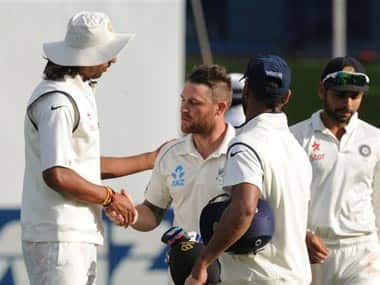A New Zealand columnist writing for Stuff.co.nz has suggested India’s performance in the recent ODI and Test series against New Zealand was not completely above board. In a piece called McCullum deserved better than India’s effort, Mark Reason goes to great lengths to recount the many, many lives India gave the New Zealand captain by dropping catch after catch in the one-dayers and the Tests. By Reason’s reckoning, there were 11 missed chances across six innings, including three chances during that innings of 302, the first of which came when McCullum was on nine. [caption id=“attachment_1398543” align=“alignleft” width=“380”]  India’s fielding was terrible in the series against New Zealand. AP[/caption] “Only two conclusions are possible,” Reason writes. “Either this Indian team is one of the worst fielding teams in the history of the game - possible, very possible, and a national disgrace if true - or something suspect is going on.” Reason says he wants to believe that the game is clean but over the last decade and a half, Indian cricket has not made that easy. He cites the example of former India captain Mohammad Azharuddin, who was banned for life for match-fixing in 2000, though the ban was overturned by the courts last year. He also makes reference to the Mudgal Committte’s report and the emergence of MS Dhoni’s name in connection with fixing in the IPL. India, he claims, has let New Zealand and Brendon McCullum down. The Indian media has not exactly been restrained in criticising the Indian team’s performance in New Zealand, going so far as to question Dhoni’s tactics and his very status as Test captain. But there have been no suggestions that anything untoward might have taken place, despite the Mudgal Committee’s recommendation that a match between Chennai Super Kings and Rajasthan Royals be investigated for match fixing. Reason’s speculations are just that – speculations. He has no hard evidence on which to hang his hat, just assumptions abut how the game is meant to be played. Unfortunately, that is often all that observers have to go on when it comes to sniffing out corruption in the game. Actual concrete evidence is rare and has typically required some sort of undercover operation, such as the now defunct News of the World undertook to smoke out the Pakistan captain Salman Butt and fast bowlers Mohammad Amir and Mohammad Asif in 2010. The reality is the actions of cricket’s administrators, including the BCCI, have rarely done much to reassure the game’s followers that all is being done to prevent corruption. Back in the 1990s. Cricket Australia tried to cover-up that they had fined Mark Waugh and Shane Warne for taking money to provide pitch and weather information to bookies. And the 2000 CBI report stated in bald terms BCCI officials must have known something fishy was going on but did nothing to stop it. Now the Mudgal Committee report has done much the same thing, submitting a list of names to the Supreme Court and recommending further investigation. It is also telling there has been no word from the BCCI since the report came out barring one comment from board vice-president Rajeev Shukla. If cricket’s bosses want the rumours and innuendo to go away, they need to start being honest and open with the fans, order an unimpeded investigation that goes wherever the evidence takes it and treat corruption as the most important issue in cricket. Anything less will mean more columns like this one and the administrators will only have themselves to blame. Read the full Stuff.co.nz. column here.
Hesson says he wants to believe that the game is clean but over the last decade and a half, Indian cricket has not made that easy.
Advertisement
End of Article


)

)
)
)
)
)
)
)
)



